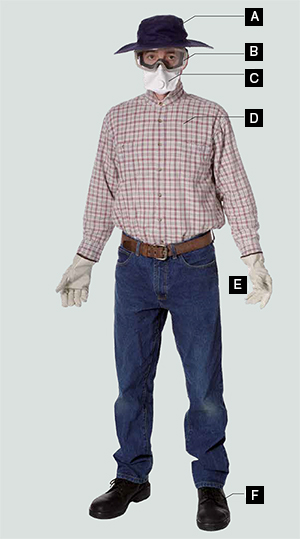Radiant heat is the heat you feel from a fire. It is the biggest killer in a fire. The best protection is distance.
Protection from radiant heat
Make sure all skin is covered.
Do not wear shorts, t-shirt and thongs.
Cover up as soon as you are aware of a fire in your area.
A solid object, such as a brick wall, can provide some protection from radiant heat.
Distance is the best protection from radiant heat. Move as far away from the fire as you can, don’t get caught out in the open.
Clothes to wear:
 Covering all exposed skin with clothing can offer some protection from radiant heat.
Covering all exposed skin with clothing can offer some protection from radiant heat.
Have a set of clothing ready for each member of the family:
| A |
A wide-brimmed hat to protect your head. |
| B |
Eye protection such as smoke goggles to shield your eyes.. |
| C |
A 'P2' type mask or cotton scarf/handkerchief for face protection and to filter smoke. |
| D |
A long-sleeved, collared shirt and long pants made from cotton or some other natural fibre. |
| E |
Tough leather garden gloves – not rubber or synthetic. |
| F |
Sturdy boots and wool or cotton socks.. |
Protective clothing and a solid shield may NOT save your life.
If you're in a car
CFA does not encourage people to travel on roads when there is a fire in the area. Late evacuation is extremely dangerous and can result in serious injury or death – always plan to leave early to avoid this situation. If you encounter smoke or flames and are not able to turn around and drive to safety, as a last resort:
1. Position the car to minimise exposure to radiant heat:
- Park away from dense bush - try to find a clearing
- If possible, park behind a barrier such as a wall or rocky outcrop
- The car should ideally face towards the oncoming fire front
- Park off the roadway and turn hazard lights on. Car crashes are common in bushfires due to poor visibility.
2. To increase your chances of survival:
- Stay in the car and tightly close windows and doors
- Cover up with woollen blankets and get down below window level - this is your highest priority
- Drink water to prevent dehydration
3. As soon as you become aware that the fire front is close by:
- Shut all vents and turn the air conditioning off.
- Turn engine off
Be prepared: if you drive in high-risk areas, keep woollen blankets in your car. This is an essential precaution during the warmer months.
Page last updated: Thursday, 21 December 2023 4:30:50 PM